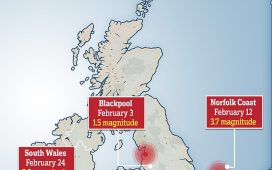[ad_1]
China is on track to deliver 1bn vaccine doses by the end of this week, after ramping up production and distribution networks in an ambitious drive to vaccinate 40% of the population by this month.
Chinese authorities have been encouraging people to take the free and voluntary doses with cash incentives, gifts and colour-coded signage to laud or shame businesses depending on vaccination rates, as well as the promise of protection against Covid-19.
While it initially started slowly, with only 80m vaccines delivered by late May, in recent weeks China’s daily rate of injections has increased to about 20m a day. Most have been one of two domestically produced vaccines – Sinopharm and Sinovac.
On Tuesday, the country’s national health commission announced that more than 901m doses of the domestically produced vaccines had been administered in China, state media reported. Per 100 head of population, China has administered a similar number of vaccines as most European nations, according to the New York Times vaccine tracker, but it has a much bigger population to reach, of about 1.4 billion.
The milestone comes as Chinese authorities in the populous city of Guangzhou battle an outbreak of the Delta variant, which was first detected in India. Authorities reported two local cases in Guangdong on Tuesday, and three on Monday, bringing the total to 150. In response to outbreaks China routinely conducts mass testing of entire cities to locate all asymptomatic and symptomatic cases.
While numbers are getting under control, and several neighbourhoods have had their restrictions lifted, some health experts have expressed concern at an apparent higher rate of critical cases among those infected. There has also been concern at the infection of two health workers, a rare event in China’s outbreak responses.
The Guangzhou municipal health commission said the two health workers, employees at the city hospital designated to treat Covid-19 patients, were likely to have been infected through accidental exposure.
Last week, a Guangdong health officials told state media had been a higher proportion of critically ill people than during the first Wuhan outbreak and subsequent regional outbreaks in China, and more people showing symptoms.
Guangdong province has been under heightened restrictions including travel bans and lockdowns of multiple districts for the past two weeks, after a relative surge in cases late last month. On Monday, restrictions were eased for 11 districts.
Prof Chan Chang-chuan, of National Taiwan University’s college of public health, said the mass vaccination effort was “really very impressive”, and while it was difficult to verify Chinese government information about the programme, it seemed to be running extensively in cities at least.
“Assuming that this is correct this will have a big impact on the herd immunity they are building,” said Chan.
Prof Chan said China’s expansion manufacturing capabilities had allowed “significant” production of vaccines, and if it kept up to complete all second doses, China could reach herd immunity.
“But there is an ‘if’, because even though the WHO has given [emergency use listing] for the two Chinese vaccines, we don’t have empirical data for their effectiveness – we have efficacy,” he said.
Chan said there was “real world data” for other vaccines like AstraZeneca, Pfizer, and Moderna, which he said showed in most cases that real world effectiveness was a little lower than the efficacy results from controlled clinical trials.
“That could be the same for China. The efficacy of both [Chinese] vaccines is not as good as the three others mentioned, so that’s a problem.”
He said there was also a potential issue in China’s vaccines using an inactivated virus of the original strain, and there were multiple new variants.
“This in theory will impact on the effectiveness … So they should increase their coverage much higher than other vaccines.”
China’s vaccines have been distributed or donated to many countries around the world, but recent reports have revealed some of the recipient nations, including Bahrain, the UAE, and the Seychelles, have launched or considered booster programmes as they experience fresh spikes in case numbers. Previously vaccinated people are being offered either a third shot of the Chinese vaccine or a new shot with a different type.
Chan said it was difficult to explain without systemic studies, but it could possibly be that the antibodies produced by the vaccines did not last long enough, or that combating the new variants required a booster shot.
[ad_2]
READ SOURCE





